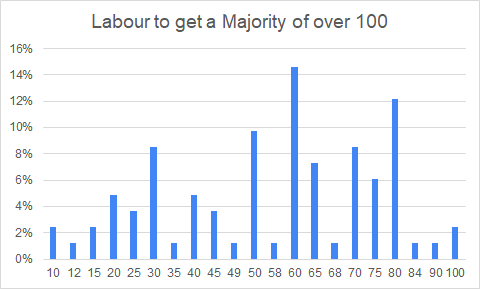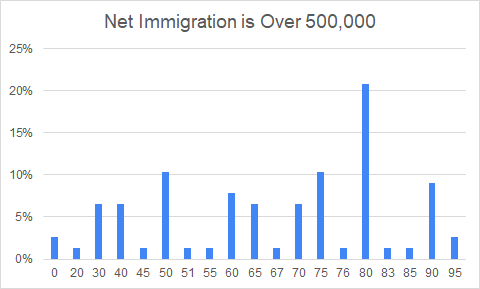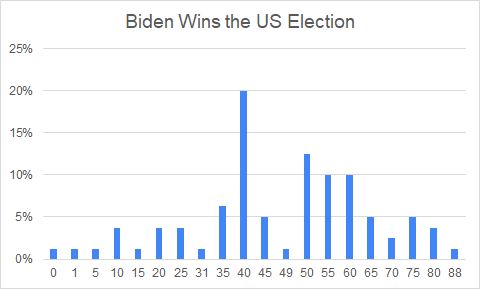What do People Think Will Happen in 2024?
A summary of the entries of the 2024 Prediction Contest.
Earlier this month I held my annual Prediction Contest, asking people to forecast how likely they thought various events were to occur in 2024. There were 45 questions, featuring UK politics and economy, global politics and world events and science, the arts and miscellany.
Here I’ll present the summary results of those predictions, as well as discussing what the ‘Wisdom of Crowds’ thinks will happen - and share my own predictions and (with his permission) the predictions of the winner of the 2023 contest. For the results, of course, we’ll have to wait until January 2025.
The original description of the contest is here, for those who want a reminder.
In total there were 83 valid entries, which is 50% up on last year, though sadly not at the 150 needed to resolve Q44 correctly1. Just over 2/3 were male, and just under 1/3 considered they worked in politics, public policy, media or current affairs (which is similar to last year).
I did better than last year in explaining the rules and not making confusing questions. Only two people entered ‘yes’ and ‘no’ rather than numbers and there were no questions with perverse answers suggesting that people had misread a double negative or similar.
Scoring is by Brier Scoring, a form of scoring that rewards people not just for getting the answer right, but for being well correllated - i.e. for getting 7 out of 10 of the questions they rank at ‘70% likely to happen’ correct. People are allowed to skip questions, in which case that answer is counted as if they had answered 50%2.
What did people think would happen?
It should be emphasised that these results are not the result of a statistically weighted poll: they are simply the aggregation of a smorgasboard of people, ranging at one end from government advisers, policy wonks and journalists to, at the other, friends of mine with self-declared little interest in current affairs3.
Nevertheless, there’s good evidence to show that if you average predictions in an exercise like this, the average will be better than most individual sets of predictions - and often pretty accurate. Different people have different information; positive and negative random errors cancel out, and so on
Last year, that’s exactly what we found. The Wisdom of Crowds (the average of all answers for a question) outperformed 80% of individuals - including many professionals in this area - and achieved a Brier score of 0.189, equivalent to predicting each event with a confidence of 75% and getting three quarters of them correct4.
Some people did even better: the winner, Martin H, got a Brier score of 0.150 - that’s better than the score someone would get if they predicted each event with a confidence of 80% and got 8 out of 10 of them right. So depending on whether or not you think he just got lucky, you may wish to pay particular attention to his predictions this year, as he has kindly allowed them to be published! Overall though, the Wisdom of Crowds results should provide - in most cases - a decent forecast.
No, seriously, what did people think would happen?
The analysis below refers to the Wisdom of Crowds results. The full details are given at the end of this post.
UK Politics and Current Affairs
People were pretty confident that there would be a General Election, that Labour would win and that the Conservatives wouldn’t be reduced to below 100 seats. There was though a tremendous divergence of opinion on whether or not the Labour majority would be greater than 100, whether the Lib Dems would get over 25 or whether Labour would beat the SNP in Scotland. People were pessimistic about Reform’s chances, but surprisingly bullish that the Conservatives would manage to limit their losses in the local elections this May5.
On the economy, it was a toss up as to whether there would be a recession, inflation remain 5%, or the Bank of England base rate fall below 4.5%. Immigration is likely to remain in the news, with a 65% forecast that net migration numbers will be over 500,000 - and only a 1 in 3 chance that more than 10 people will be sent to Rwanda.
Meanwhile, people think it is twice as likely that income tax will be cut as opposed to inheritance tax abolished.
World Politics and Global Events
Putin and Xi are thought highly likely to remain in power - and Modi is odds on to win the Indian election. Biden, meanwhile, is - very narrowly - considered the underdog.
Most people are predicting a stalemate in Ukraine, with no cease-fire and neither side making major territorial gains. Depressingly, people think it is more likely that China will blockade Taiwan than that there will be a cease-fire in Ukraine6. In the Middle East, there was a very wide range of opinions on what would happen, no doubt reflecting the unpredictable scenario of the region, but many people assigned a reasonable likelihood to Hezbollah entering the war, deaths exceeding 100,000 or many Palestinians being forced to leave Gaza.
Continuing the theme of pessimism about global instability, on average, the chance of Venezuela annexing Essequibo in Guyana was just over 1/3, the same as a lasting cease-fire in Sudan.
Science, Entertainment and Miscellany
There’s a more than 50% chance that this summer will be the UK’s hottest on record, according to the Wisdom of Crowds. People are also cautiously optimistic that SpaceX’s Starship will carry out a successful mission and that Dune 2 will take more than half a billion dollars at the box office.
Meanwhile, Aaron Taylor-Johnson is given a 1 in 3 chance to be the next Bond - and contestants were unconvinced that life would be discovered upon an exoplanet, despite the Spectator’s tantalising story over Christmas.
The full results follow - but first, if you found this post interesting, please share it.
Overall I found this year harder than last - though whether that’s because I asked harder questions or that events are more uncertain is hard to say. Analysing my predictions bore this out: last year, my average confidence was 73, whereas last year it was 76 - a noticeable, if small drop7. It will be interesting to see if the results bear it out.
My typical post / weekly readership is roughly triple what it was this time last year, hence picking 150 (roughly triple) for this question. But with hindsight it makes sense that this wouldn’t scale directly.
However, skipped answers are omitted for the purpose of calculating the Wisdom of Crowds.
Though presumably enough to complete the survey.
This is an average. In reality people clearly assigned different probabilities to different questions.
I personally am more sceptical about that.
I disagree: though I think neither is likely, the blockade is less likely.
This classes a prediction of 80% and a prediction of 20% as identical; i.e. both 80%.






I think it likely 2024 will be the hottest year on record for the planet, but looking at the time series British summers are way more variable. I thought this was a question where lots of people would unthinkly put >50% because of global warming, and I was likely to build up some points. I note you and Martin concur.